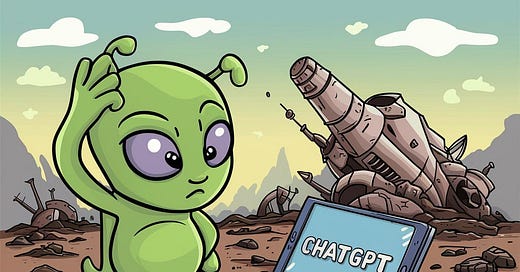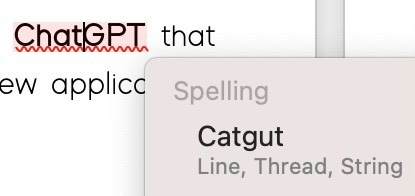Internal software tools or to-be user-facing software still in a research or development phase tend to have arcane and/or acronymised names, typically bestowed by the team developing the software.
However, before that software gets released to the public, it typically gets rechristened by the brand/marketing team following a brainstorm, some form of user research and trademark due diligence by the legal team.
And the higher profile the product, the more time, effort and money, tends to go into its naming.
Whilst BBC Sounds was in development it was known internally as CAP (short for the Combined Audio Product). Before its official launch, BBC iPlayer was named iMP.
When OpenAI released ChatGPT in November 2022 it reportedly viewed it as a “research preview”, which don’t typically get a whole lot of attention from branding and marketing teams.
I don’t know for sure, but have a strong hunch software developers named ChatGPT and the branding/marketing team let it go because it was a ‘just’ a research preview.
However, two months later, ChatGPT was reaching 100 million users, was all over the news and had become a popular Google search team. The die was cast on the name.
A portmanteau of Chat and GPT (which stands for Generative Pre-trained Transformer - a Ronseal description of the chatbot’s underlying Large Language Model), it’s an unwieldy four syllables and isn’t easy to remember or natural to use as a verb (unlike Google, eBay, Photoshop, Zoom, WhatsApp).
Many people struggle to get the GPT in the right order (a Google search for “ChatGTP” returns 622,000 matches).
OpenAI nevertheless doubled-down on the GPT acronym, using it to brand user-created variants of ChatGPT (‘GPTs’).
And other AI products were quick to adopt one of other half of the ChatGPT portmanteau (e.g. ChatPDF, AgentGPT, AutoGPT). OpenAI’s attempts to trademark the GPT acronym have thus far failed.
OpenAI’s other widely used product - an AI image generator - is named DALL·E, after the eponymous robotic protagonist of the 2008 Pixar movie WALL·E, with a nod to Spanish surrealist Salvador Dali.
I’m personally a sucker for a punning name.
However, as well as having an ambiguous pronunciation (does the DALL rhyme with GAL or GALL? Or is it DAHL like the curry ingredient/children’s author?), it mirrors Pixar’s use of an interpunct (·) - a symbol that doesn’t appear on a standard keyboard (TAFKAP would be proud).
OpenAI’s forthcoming AI video generator, Sora, feels like it’s had a bit more input from the branding team. Meaning ‘sky’ in Japanese and widely used in anime and manga, it’s quick to say (two syllables to ChatGPT’s four), whilst still being eminently ownable.
As generative AI continues to grow up, we’re likely to see fewer high-profile developer-named products in the wild, although foundation models, which are more D2D (developer-to-developer) than B2C, are likely to continue to be a rich source of arcane names with esoteric capitalisation (see LaMDA, LLaMA, PaLM, CM3leon).






